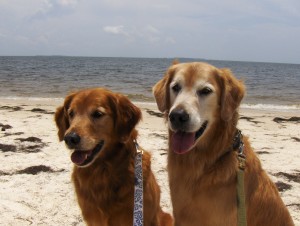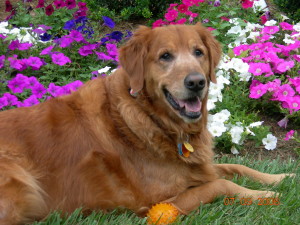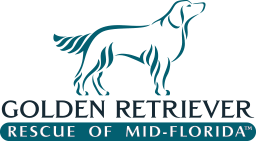Why Adopt a Rescue?
By Sarah Davis, GRRMF Founder
What is rescue all about? Why are we hearing more and more about organized rescue groups? Why have a rescue group for a specific breed?
Rescue can take many forms, from a single individual trying to make a difference by saving one dog to a group of people working together for the common goal of saving many animals. GRRMF concentrates on golden retrievers because we are passionately devoted to this breed. All across America, local golden retriever rescue groups are working to save golden retrievers that show up wandering the streets, in shelters or are surrendered by their owners.
The National Rescue Committee of the Golden Retriever Club of America strongly supports local golden retriever rescue groups. Today most national dog breed clubs do the same. There are also many all-breed rescue groups across the nation.
All types and almost any breed of dog can be found in your local shelters. But before you adopt a dog from a shelter or a rescue group, you should do some research first and find out what kind of companion would be best for you. Are you active, do you like to jog, or are you more of a couch potato? Do you like a really neat house – would handfuls of shedding coat drive you crazy? Do you enjoy grooming a dog? Should it be big or small? Quiet or a watchdog? Is this your first dog or are you experienced with dogs? You should have a really good idea of what you are looking for in a dog before you contact a rescue or make a trip to a shelter. Avoid making a quick emotional decision. The dog you select will be a member of your family for a very long time, so do not pick a dog hoping it will fit into your lifestyle, rather chose one that does fit your lifestyle.
Why do dogs wind up in shelters or in rescues? Why do owners give up these wonderful dogs? Why would a wonderful gentle breed such as the golden retriever end up in a shelter? The reasons will astound you. Typically people think only bad dogs or dogs with really bad problems end up in shelters. WRONG, WRONG, WRONG. Most dogs wind up in shelters or rescue due to circumstances over which they have no control: family moving, divorce, children who become allergic to them, lack of time and commitment on the part of the owner or financial troubles. Some puppies just get too big or require more time than the owner originally planned. While it is true some shelter or rescue dogs have not been taught any manners, or been well socialized, it is also true that this situation is easily remedied if the new owners will just invest some time with the dogs. Goldens are darling puppies that grow up to be large, social dogs that require an outlet for their energy, both physical and mental. They are not “couch potato” dogs until well into their senior years; they are very affectionate and social and do not do well when ignored or banned to the outdoors. With proper training and attention they really respond given their natural intelligence and willingness to work.
Obedience classes are an excellent way to begin working on manners and focusing the energy of the dog. These classes also help to develop a bond between dog and owner and teaches the dog how to please. Often dogs are not taught how to please their owners but are magically expected to respond in the right way. Humans and dogs are two different species coexisting together and unless dogs are taught how to react and respond to human expectations, they will respond in doggie terms. It is perfectly acceptable in dog society to jump up and get in your face to greet you, as that is how dogs often greet each other. Most people do not find this acceptable and need to teach the dog to sit, enjoy a chest rub, and then bend down to look in the dogs face and greet them. See the chance for miscommunication? The person sees the dog jumping up as being bad, the dog just sees it as a greeting. He must be taught to sit and wait for the greeting, and he is happy to do it once he understands. The best place for humans and dogs to learn how to understand each other is in a good obedience class. Obedience classes are also an excellent way to bond to your new companion. Many times we get older dogs into rescue. The general rule of thumb is the older the dog the more civilized it is because he has had more time to learn the rules.
We live in a mobile and disposable society. Too often getting a puppy is an emotional, spur of the moment decision and it is the dog that winds up paying the price. Once we adopt a dog we must be prepared to care for them for their lifetime. There is no other creature on earth as loyal as our loving canine friends; all they ask is to be by our side and be a part of our family. They do not care if we are rich or poor, thin or fat, we are all beautiful in their eyes, they just love us because we are theirs. Next time you are considering a pet, check out your local shelter or rescue group. Now you know that good dogs really do go to the pound or get turned over to rescue groups, and there is one just waiting for you!
Note: Sarah was our first GRRMF president, but moved to St. Louis in 1998 so watched GRRMF’s progress from afar. In 2013 she moved back to Florida and now works on our adoption team. We are thankful to have her back!!
